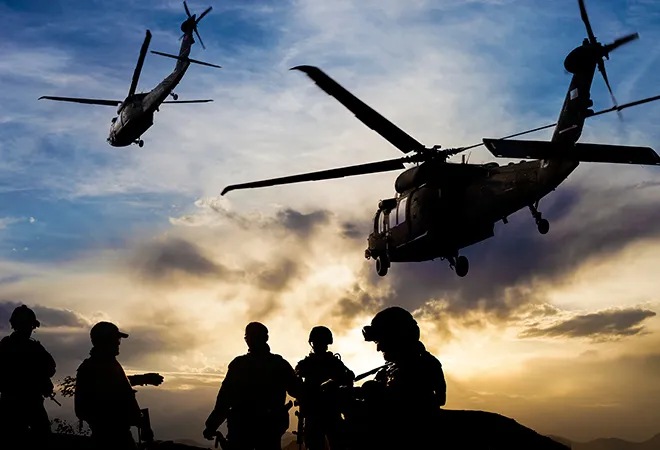
The US and the Taliban are the closest they have ever been to signing a deal, but it is unlikely that peace can be expected from it. The agreement will begin a seven- day “
reduction in violence”, that if successful, is likely be followed by a broader agreement that includes talks between the Taliban and the Afghan government and the start of a withdrawal of US troops from the country. Many are optimistic that this is the
best chance to end Afghanistan’s war. After all, it’s the closest both sides have come to agreeing on anything. While the deal, may be the only option left on the table for Washington to sign, there are still many red flags and questions that remain unanswered.
The negotiations between the United States and the Taliban are based on a series of presumptions and best-case-scenarios, that are precariously linked to the hopeful ideal that the Taliban will hold up its end of the bargain. Can the Taliban be pro-peace or pro-democracy? If not, what can be done at this stage to bring the Taliban into the fold without making serious compromises on Afghanistan’s sovereignty and democratic principles? These are the questions that President Ghani and his team will have to contend with in the coming months.
Through the course of the Taliban’s history, from the early nineties to the present day, the group has altered their rationale for waging jihad depending on the circumstance. While initially their battle was against the Soviet occupation, it evolved to fighting against the ‘moral corruption’ of mujahideen commanders, followed by resisting the leftover mujahedeen forces as they established their emirate, to post 2001 when the group’s rhetoric was built around battling foreign ‘invaders’ or in other words, the United States and their allies. What will the Taliban fighters’ rationale for being a member of the group be, once the US leave? If we can learn anything from the past it is that the group will once again alter its raison-de-etre to fit the new political dynamic.
Taliban members have long held the idea that only they are the legitimate holders of power in Afghanistan and that it is their divine duty to protect the nation from foreign aggressors. Until now, the group has been steadfast in its refusal to negotiate with the Kabul government viewing it as a puppet of Washington. The fighters’ allegiance and obedience to their supreme leader Mullah Akhundzada remain sacrosanct with the group’s rhetoric asserting that they are the sole determinants for what is
acceptable behavior in Islam. There is nothing to show that the Taliban have suddenly changed their commitment to militancy and extremism. The
themes of jihad in Taliban’s rhetoric have been uncompromising, leaving little room for the group to rationalise compromising the movement for a negotiated settlement, even after international troop withdrawal.
A ‘reduction in violence’ agreement does not automatically lead to peace due to the fact that the negotiations have led the more hardline members of the militant group to believe that the group’s ideology and commitment to jihad is weakening, pushing them to
join forces with the Islamic State. Last year, as reports of a possible deal circulated, the Islamic State took responsibility for a
brutal attack where a suicide bomber detonated his vest in the middle of wedding party in Kabul, killing sixty three people and injuring over a hundred. Unfortunately, such attacks are likely to continue, particularly if the Taliban sign an agreement. While the group may have promised that it will not allow al-Qaeda to plan attacks on Afghan soil, who will take responsibility for the Islamic State and their campaign of terror? Even if the US and Taliban are not at each other’s throat, they will along with the Afghan government still have to contend with the Islamic State.
The signing of a ‘reduction in violence’ or a withdrawal agreement is expected to be a precursor to the real negotiations that need to take place between the Taliban and the people of Afghanistan. However, political instability and infighting that have been a trademark of Afghan politics makes it difficult to imagine all political parties and actors on the same page. The Ashraf Ghani government continues to suffer from accusations of electoral fraud and corruption, while opposition leaders such as Abdullah Abdullah remain concerned with shoring up support for their own political ambitions. The lack of maturity in understanding the importance of unity, at a time like this is, is sure to plague the country as the next round of talks and negotiations begin.
In the end, all the promises made by either side will mean nothing, unless there is a significant and fundamental change in the thinking of Pakistan. Its support for the Taliban and Haqqani Network and obsession with having control over the politics of Afghanistan is what has driven the country to generations of war. President Trump may be eager to leave Afghanistan, wanting to keep his promise of ending America’s endless wars in an election campaign year but the Afghan war and dreams of peace are far from over and an American withdrawal will only prove that.
The views expressed above belong to the author(s). ORF research and analyses now available on Telegram! Click here to access our curated content — blogs, longforms and interviews.



 The US and the Taliban are the closest they have ever been to signing a deal, but it is unlikely that peace can be expected from it. The agreement will begin a seven- day “
The US and the Taliban are the closest they have ever been to signing a deal, but it is unlikely that peace can be expected from it. The agreement will begin a seven- day “ PREV
PREV


